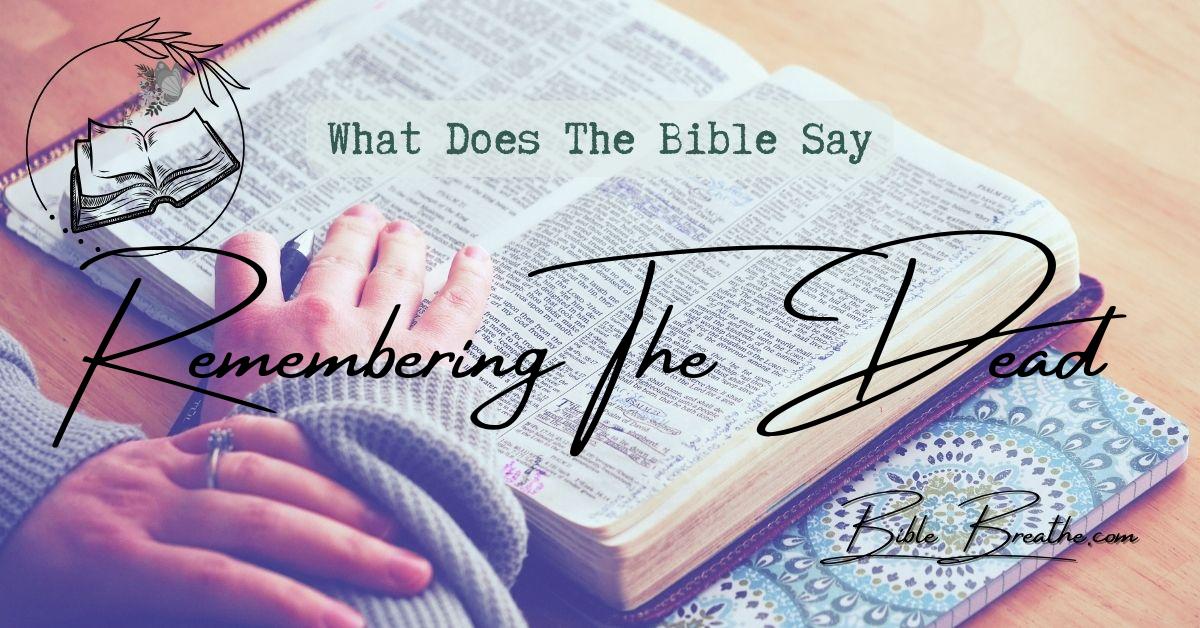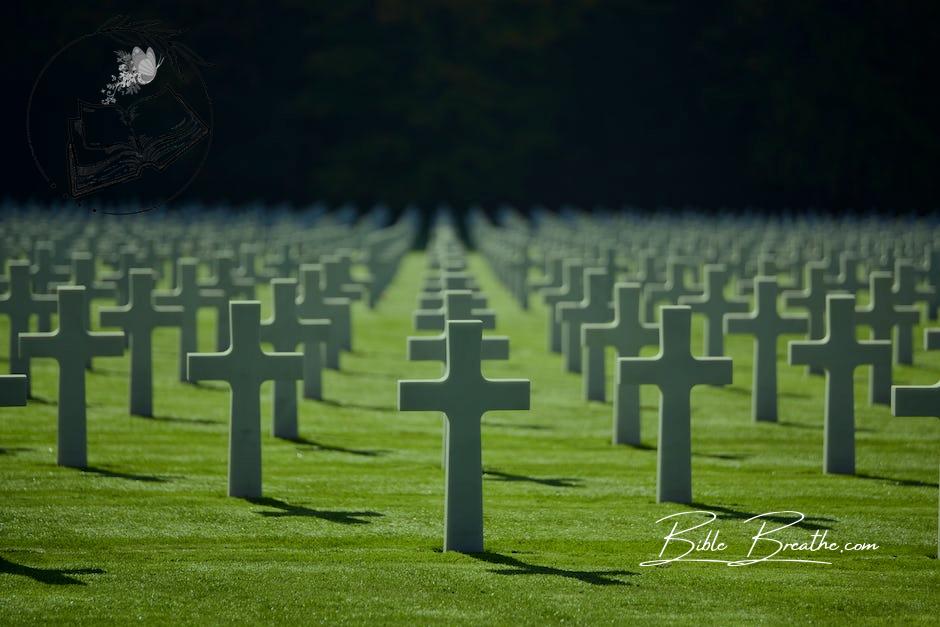What’s the Bible’s take on remembering the dead?
It’s like uncovering a treasure chest of timeless wisdom!
Picture this: in cultures and faiths worldwide, we’re all about mourning, honoring, and remembering our loved ones who’ve gone ahead.
But here’s the deal – let’s dive into the Good Book and get some divine perspective on this.
The Bible’s all about those family genealogies – like our spiritual ancestry chart.
It’s packed with lessons on faithfulness, wisdom, and doing the right thing.
And you know what?
It’s a reminder of our own mortality, urging us to soak up life’s lessons.
And then, the big one: resurrection.
It’s like the ultimate comeback story, and it’s not just about today.
It’s a promise that death doesn’t have the final say!
As we unpack the Bible’s teachings, we’re exploring our heritage, our legacy, and finding comfort in the grand story of life and death.
So, let’s get into it, and see what divine wisdom awaits us.
Key Takeaways
- The Bible underscores the significance of remembering the dead, encouraging believers to honor the memory of those who have passed away. It acknowledges the importance of acknowledging the lives and contributions of those who came before us.
- Understanding and applying these biblical teachings regarding remembering the dead can enrich and deepen our lives. Reflecting on the lives of the departed can impart valuable lessons, wisdom, and insights that can guide us in our own life journeys.
- Remembering the dead extends beyond merely recalling the past. It involves drawing upon the legacies and experiences of those who have gone before us to shape our present attitudes, behaviors, and decisions. It’s about learning from their successes and failures, allowing their stories to influence our actions and choices in the present.
- This practice provides a sense of continuity and connection with our history and the people who contributed to our existence. It helps us appreciate our roots, culture, and heritage, fostering a greater sense of belonging and identity.
- Ultimately, remembering the dead is a way to acknowledge the ongoing impact and relevance of their lives. It serves as a reminder of the interconnectedness of generations and the profound impact individuals can have even beyond their time on Earth.
Cherishing the Departed: Why Remembering Matters
Photo modified by BibleBreathe.com. Original photo by Josh Hild on Pexels
In the grand story of humanity, taking a moment to remember those who’ve passed is like retracing our steps through time, connecting us to our roots, our legacy, and the very essence of being human.
Peering into Darkness: Cambodia’s “Year Zero”
“To start anew, a nation must wipe the slate clean.” – Khmer Rouge Proverb
Back in the 1970s, Cambodia descended into a horrifying nightmare during the Khmer Rouge regime.
They pushed a ghastly idea called “Year Zero,” an ideology aiming to erase any trace of the past, including memories of the departed.
This part of history is a stark warning of what happens when we forget the past.
It was a time when remembering was suppressed, and the fallout was disastrous.
The Cost of Amnesia
“If we can’t recall history, we’re doomed to relive it.” – George Santayana
So, why is it so vital to remember the dead?
The answer lies in the wisdom held by history.
When we honor those who’ve passed, we’re not just paying homage to their lives; we’re also gaining invaluable insights.
Our ancestors’ histories, their faithfulness, and their sacrifices give us a spiritual perspective on mortality, justice, and what lies beyond.
In the Bible, we discover numerous teachings stressing the importance of remembrance.
It’s a way of honoring our lineage, preserving our spiritual roots, and gleaning wisdom from the tales of those who walked before us.
The Gospel itself stands as a testimony to the greatest sacrifice and the promise of resurrection and eternity.
In Closing: A Timeless Source of Strength
In a world bustling with distractions and fleeting moments, remembering those who’ve passed stands as a guiding light of hope and strength.
It brings into focus our shared humanity, the sacrifices made for our well-being, and the everlasting truths that steer our lives.
As we contemplate the past and its teachings, we discover the courage to navigate the challenges of today and embrace the promise of what comes after.
Embracing the Bible’s Wisdom on Honoring Loved Ones Who’ve Passed
Photo modified by BibleBreathe.com. Original photo by Pascal Ingelrest on Pexels
Life’s journey, my friends, is like a winding river.
It starts with a babbling brook, grows into a rushing stream, and eventually merges with the vast ocean.
A journey we all embark upon, and inevitably, we reach that point where our earthly voyage finds its conclusion.
Now, let’s dive into the deep waters of the Bible to discover what it says about remembering our loved ones who’ve embarked on that final stretch.
Cherishing Those Who’ve Set Sail
“The Lord treasures the passing of His saints.” – Psalm 116:15 (KJV)
In the tapestry of life, the Bible weaves a thread acknowledging the worth of honoring those who’ve sailed beyond the horizon.
It’s not merely a tradition but a profound acknowledgment of our shared human experience.
Remembering the departed is a celebration of their life’s journey, the footprints they left, and the echoes of their presence that reverberate in our hearts.
Remembrance: A Beacon in the Storms of Life
Picture a lighthouse on a rocky shore, guiding ships through tumultuous waters.
Likewise, moments of remembrance in our lives serve as beacons, guiding us through the storms of grief.
Think about Memorial Day – more than a day off or a chance for a backyard grill-out, it’s a solemn occasion to honor those who sacrificed for a greater cause.
It’s about drawing wisdom and strength from their sacrifice.
The Bible teaches us that remembering the departed isn’t just about grieving but also about learning from their journey, their wisdom, and their unwavering faith.
It’s a glimpse into our own mortality, urging us to seek wisdom and purpose.
The Christian Voyage
“The living know they’ll cross the finish line, but the departed feel nothing, their story fading into the past.” – Ecclesiastes 9:5 (KJV)
In the Christian tale, remembering our departed loved ones carries a spiritual significance.
It steers our eyes to the eternal horizon, where the promise of resurrection glimmers like a distant shore.
It nudges us to live with righteousness, faithfulness, and purpose, knowing that our actions etch their mark on the sands of time.
In essence, the Bible beckons us to remember the departed not as a somber duty but as a wellspring of encouragement, a lesson in life’s brevity, and a reminder of the legacy we’re crafting.
It’s a call to navigate our journey, mindful of the wake we leave behind – a legacy that echoes through eternity.
Cherishing the Departed: Why Remembering Matters
Photo modified by BibleBreathe.com. Original photo by Suzy Hazelwood on Pexels
In the grand story of humanity, taking a moment to remember those who’ve passed is like retracing our steps through time, connecting us to our roots, our legacy, and the very essence of being human.
Peering into Darkness: Cambodia’s “Year Zero”
“To start anew, a nation must wipe the slate clean.” – Khmer Rouge Proverb
Back in the 1970s, Cambodia descended into a horrifying nightmare during the Khmer Rouge regime.
They pushed a ghastly idea called “Year Zero,” an ideology aiming to erase any trace of the past, including memories of the departed.
This part of history is a stark warning of what happens when we forget the past.
It was a time when remembering was suppressed, and the fallout was disastrous.
The Cost of Amnesia
“If we can’t recall history, we’re doomed to relive it.” – George Santayana
So, why is it so vital to remember the dead?
The answer lies in the wisdom held by history.
When we honor those who’ve passed, we’re not just paying homage to their lives; we’re also gaining invaluable insights.
Our ancestors’ histories, their faithfulness, and their sacrifices give us a spiritual perspective on mortality, justice, and what lies beyond.
In the Bible, we discover numerous teachings stressing the importance of remembrance.
It’s a way of honoring our lineage, preserving our spiritual roots, and gleaning wisdom from the tales of those who walked before us.
The Gospel itself stands as a testimony to the greatest sacrifice and the promise of resurrection and eternity.
In Closing: A Timeless Source of Strength
In a world bustling with distractions and fleeting moments, remembering those who’ve passed stands as a guiding light of hope and strength.
It brings into focus our shared humanity, the sacrifices made for our well-being, and the everlasting truths that steer our lives.
As we contemplate the past and its teachings, we discover the courage to navigate the challenges of today and embrace the promise of what comes after.
Frequently Asked Questions (FAQs) About What Does The Bible Say About Remembering The Dead
Why is it important to remember the dead from a biblical perspective?
In the Bible, remembering the dead is important as it honors their legacy and allows us to reflect on our own mortality.
It provides an opportunity for prayers, gratitude, and the hope of resurrection.
How does the Bible guide us in mourning and honoring the deceased?
The Bible guides us in mourning and honoring the deceased through prayers, comforting one another, and celebrating the departed’s life while finding solace in the promise of eternal life.
What lessons can we learn from the Bible about facing our own mortality?
The Bible emphasizes the brevity of life and the certainty of death, prompting reflections on life’s purpose and the afterlife.
Scriptures like Psalm 90:12 urge a heart of wisdom, encouraging believers to live with an awareness of life’s fragility, preparing for eternity.




